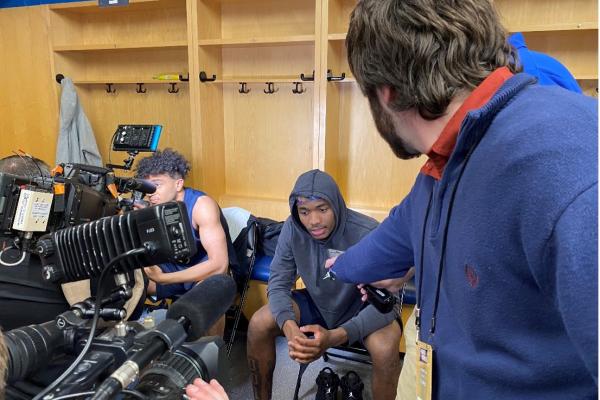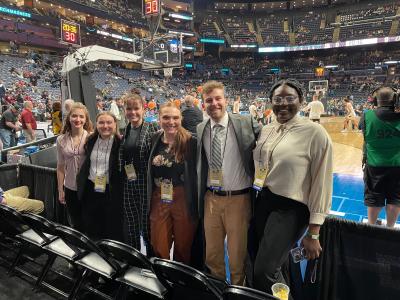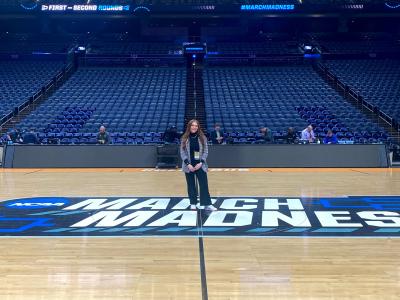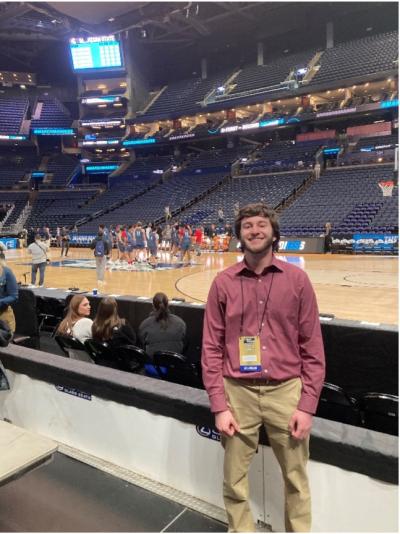March On: Ohio State students experienced the NCAA tournament from the media front lines

By Lauryn Luderman and Tyler Boroshok
Ohio State's School of Communication and SSI were honored to connect students with the experience to work as part of the media contingent for the first and second rounds of the men's NCAA March Madness tournament. Here is the experience from the perspective of two of our participants.
Lauryn's Story
When I signed up to work March Madness last fall, I wasn’t sure what I was getting myself into. Little did I know it would be one of the most incredible experiences of my Buckeye career.
Columbus hosted eight teams for the first and second rounds of the NCAA March Madness Tournament at Nationwide Arena March 16-19. Associate Athletic Director Dan Wallenberg, was looking for student volunteers to aid the professional media, which is where I came in.

The other volunteers and I, maybe 25 of us, attended an orientation of sorts on March 15 where we received a tour of the arena and learned some details of our jobs. My assignment was called “locker room quotes,” so I asked Wallenberg if we were to come with questions prepared to ask the players.
Wallenberg told me the professional media would do most of the asking, but we could get involved if we wished. I later found out, in most locker rooms, this was not the case.
The teams at the tournament included No. 1 Purdue, No. 2 Marquette, No. 7 Michigan State, No. 8 Memphis, No. 9 Florida Atlantic, No. 10 USC, No. 15 Vermont and No. 16 Fairleigh Dickinson. As our locker room team quickly found out, the media only wanted to cover the two Big Ten schools and Marquette.
March 16 was a practice day. Every 20 minutes we were in a new locker room asking questions and gathering quotes from players we had never heard of. This was a challenge. After gathering quotes, we rushed to our computers, transcribed them and sent them off to our supervisor, tournament administrator Alissa Clendenen.
Clendenen then printed out the quotes and put them on a table for the professional media to pick up and use in their stories.
Because we didn’t know who we were talking to, my strategy going into each locker room was to walk up to the player who a) was very tall, or b) looked friendly.

The questions I asked started off basic since my knowledge was limited. For example, I’d ask, “Looking ahead of your game tomorrow, where is your head at,” or “Has the preparation for this game been different from any other game?” I typically ended each interview with my personal favorite, “Do you have any gameday rituals, or superstitions?”
I found out Marquette’s sophomore forward David Joplin wears Lebron James shorts under his warmups during shootaround and Fairleigh Dickinson freshman guard Brayden Reynolds gets the same McDonald’s meal every gameday: a 10-piece chicken nugget, large fry and large coke.
My most memorable encounter from the first practice day was speaking with Purdue’s 7-feet, 4-inch center and 2023 Big Ten Player of the Year Zach Edey, though he was not very sociable.
Once the day was over, I went home and gabbed away about my day on FaceTime to my dad who was impressed by my encounters.
The next day was the first game day. I knew I’d be at the arena for upwards of 16 hours, but I didn’t mind.
I arrived with fellow-student volunteers Tyler Boroshok, Jayla Vanhorn and Sharon Nymel, and we got right to work handing out programs before the first game, USC versus Michigan State, began.
“I came in with no clue how I ever considered doing anything else with my spring break,” Boroshok said. “It felt like we were constantly on the move and I ended every day exhausted, but there could not be a more rewarding experience.”
We sat courtside during each game. After the final buzzer, we would hurry to the winner’s locker room, interview key players and then nervously enter the loser’s den. Despite the loss, each player we spoke to was respectful.
It was the same routine as the first day, rushing back to the media’s room and transcribing the quotes before moving on to the next.
FDU versus Purdue was the third game of the day. The tallest player going up against the shortest team in the country. FDU came from behind and defeated the top seed. This was only the second time a 16-seed ever beat a one-seed and I witnessed it. I’ll admit it was hard to keep my composure and stay professional.
We were all eager to get into FDU’s locker room following the game and gauge their feelings and excitement. To our surprise, no other media was in the room aside from my group, and we noticed how much they appreciated us for being interested in their story.
FDU’s senior guard Heru Bligen complimented Nymel on her ability to interview, which is a testament to the charisma, character and gratefulness FDU displayed through every interaction.
“My memorable moment was being praised by one of the FDU players,” Nymel said. “Initially, I was very nervous, but after receiving encouragement, it gave me courage.”
The next day was another practice day. It was the same as before, but this time it started to feel like we knew the players. I began studying up on them so I could ask more informed, in-depth questions about their personal game.
We only worked about five hours Saturday, so we could catch up on rest before the final game day.
Sunday came too quickly in that I wasn’t ready for this experience to be over. The day began with Marquette versus Michigan State. The Spartans took the win, which made for an easy, media-filled, post-game locker room.
Marquette’s room, on the other hand, was filled with sadness. This had to have been one of the most uncomfortable situations I’ve been in, but it was certainly a good learning experience.
The final game of the weekend was between FDU and FAU. One single section of the arena was rooting for the Owls, while the rest of the crowd was team Knights. After FDU lost, the crowd continued to chant “FDU” as they walked off the court.
After our final time invading the locker rooms, I drove Boroshok, Nymel and another volunteer home. We couldn’t stop laughing and reminiscing about the amazing memories we made.
This experience solidified why I want a career in sports media.
I’m so grateful to everyone that made this happen and I learned more than I thought possible.
Tyler's Story
I served as a volunteer on the Media Coordination Team at the first two rounds of the NCAA Men’s Basketball Tournament in Columbus. Throughout the event, I worked as a quote taker, conducting interviews alongside an incredible team of student volunteers and transcribing quotes to be printed and distributed to over 450 media members in Nationwide Arena.
This experience gave me a unique opportunity to witness history, connect with industry professionals, and develop new skills as I look to launch my career. Seeing the full March Madness experience up close and personal was the best experience I could’ve asked for, and I’m thrilled to share my takeaways from my time as a volunteer.
Getting Thrown into the Fire
What terrified me initially became the experience of a lifetime. Make no mistake, it was a rough start. My first interviews were awkward, and players were confused by my questions. Luckily, I was able to lean on the other quote takers for support and watch what they did.
By the time we got to the third locker room of the day, I felt completely comfortable talking to the players and asking questions. By the end of the weekend, the media coordination team and I got used to being surrounded by media members and TV crews recording our interviews.
The most important thing I learned from this experience is that to get a good interview, you have to make the players feel comfortable just talking to you, which leads me into my next takeaway.
Student-Athletes are Still College Students

It can be easy to forget when looking at people like Zach Edey, but these players are college students just like us. In many cases, I was older than the players I talked to. In my first few interviews, I tried too hard to sound like the reports I see on TV, which resulted in short, overly formal, media-coached answers. The best quotes came naturally once I embraced my lack of experience and engaged in a friendly conversation with players.
I started every interview by shaking their hand and introducing myself before recording. At the end, I would shake their hand again and thank them for their time. I quickly found that I had much more natural conversations with players once they knew that I was a college student taking in the moment just like them.
Instead of continuing with my long-winded questions, I changed my approach to one that was much less formal, keeping my questions short and open ended, allowing the players to dictate the flow of the interview. I talked to them how I talk to my classmates, and this unconventional interview style seemed to put them at ease.
As a result, I was able to form relationships with players on Thursday and Friday, and they were happier to talk to me the rest of the weekend, even after losses. This led to truly special moments.
After practicing on Saturday, Marquette’s Olivier-Maxence Prosper approached me because we had talked each of the last two days. After our interview, Prosper went into the back room with the medical staff rather than talking to the TV reporters that were in the room. It felt amazing to know that one of college basketball’s rising stars made time for me because we were both so comfortable with each other.
In Fairleigh Dickinson’s locker room, I talked to Sean Moore and Joe Munden Jr. all four days. After the Knights’ historic win on Friday, Moore remembered our conversation and waited outside the locker room until I gave him a fist bump before heading to the press conference. On Saturday night, Munden followed me on Twitter when he saw that I had posted some of his quotes.
This just goes to show how far making personal connections can take you as an interviewer.
Speaking of FDU…
Front Row Seat to History
There’s a rule that cheering is not allowed when sitting in the media section. In the face of history, some rules are just impossible to follow.
I think I speak for all of us sitting right behind the basket when I say I will never forget watching FDU beat Purdue. There is no environment that could compare to Nationwide Arena when the final buzzer sounded and the 16 seed won a tournament game for just the second time ever. By the end of the game, everyone from the student volunteers to the pros who have been doing it for years was cheering – sorry NCAA. It’s not called March Madness for nothing.
While we were not supposed to celebrate, we just could not help it, as everyone who spent time around them knew there could not be a more deserving group. Everyone in FDU’s locker room, players and staff alike, worked so hard to make history. I had great conversations with their players all weekend, as they were humble, dedicated, and appreciative of every media member. Plenty of teams talk about togetherness, but none embody it on the court like FDU did this weekend. I am lucky to have witnessed history and make meaningful connections with the men who made it happen.
Networking with Professionals
There were over 450 credentialed media members in Nationwide Arena throughout the weekend. During a busy schedule, I took advantage of the limited downtime and talked to as many people as I could. The media lounge was filled with people from just about any industry you could imagine. I connected with team managers, social media coordinators, camera crew members, sports reporters and so much more. I even ended up with the business card of an arena security team member who dresses up as Santa for parties.
If you find yourself in a similar opportunity, talk to as many people as you can. Everybody was happy to answer my questions about their jobs, and I learned a lot about the sports industry that’ll help me as I search for jobs. Even if people are busy, more often than not they’ll tell you to catch up with them later or give you a business card to reach them after the event. You can never learn too much about the industry, and professionals are always looking to help students looking for guidance.
No Such Thing as Unqualified
My biggest hope for those who read this is that they will realize anyone can do what I did. As I said earlier, I had no experience conducting interviews prior to this weekend. I am in my last semester of college, but I did not start getting involved around campus until my senior year.
While many of us in college battle with imposter syndrome, it’s important to know that we really are as capable and deserving as our professors, mentors, and family tell us we are. I worked with people of all ages, including first-year college students and grown adults who had never worked at an event like the NCAA Tournament. No matter what level of experience we came in with, everyone came out of this event with a strong sense of achievement.
I am still in awe at what all of us were able to accomplish, and I hope that my experience will encourage others to take a chance at challenging opportunities that may scare them. I did, and I was rewarded with the best weekend of my life.
Final Notes
As much as I love writing about my own experience, this article would be incomplete without acknowledging those who helped me along the way. First, I want to thank my incredible team of volunteers. We all put so much work into this weekend, and I could not have done it without the support of my fellow students. I am so proud of everything we were able to accomplish together. I also need to thank Dan Wallenberg, who organized everything for us. Last but not least, I would like to thank Dr. Nicole Kraft who set me up with this incredible opportunity.
If there’s one lasting message I can leave you with, it is to just take advantage of the opportunities you have at Ohio State. We are fortunate to attend a university that is at the forefront of so many industries. Get to know your professors and connect with them on a personal basis and there is no limit to what you will be able to do in your time as a student here.
